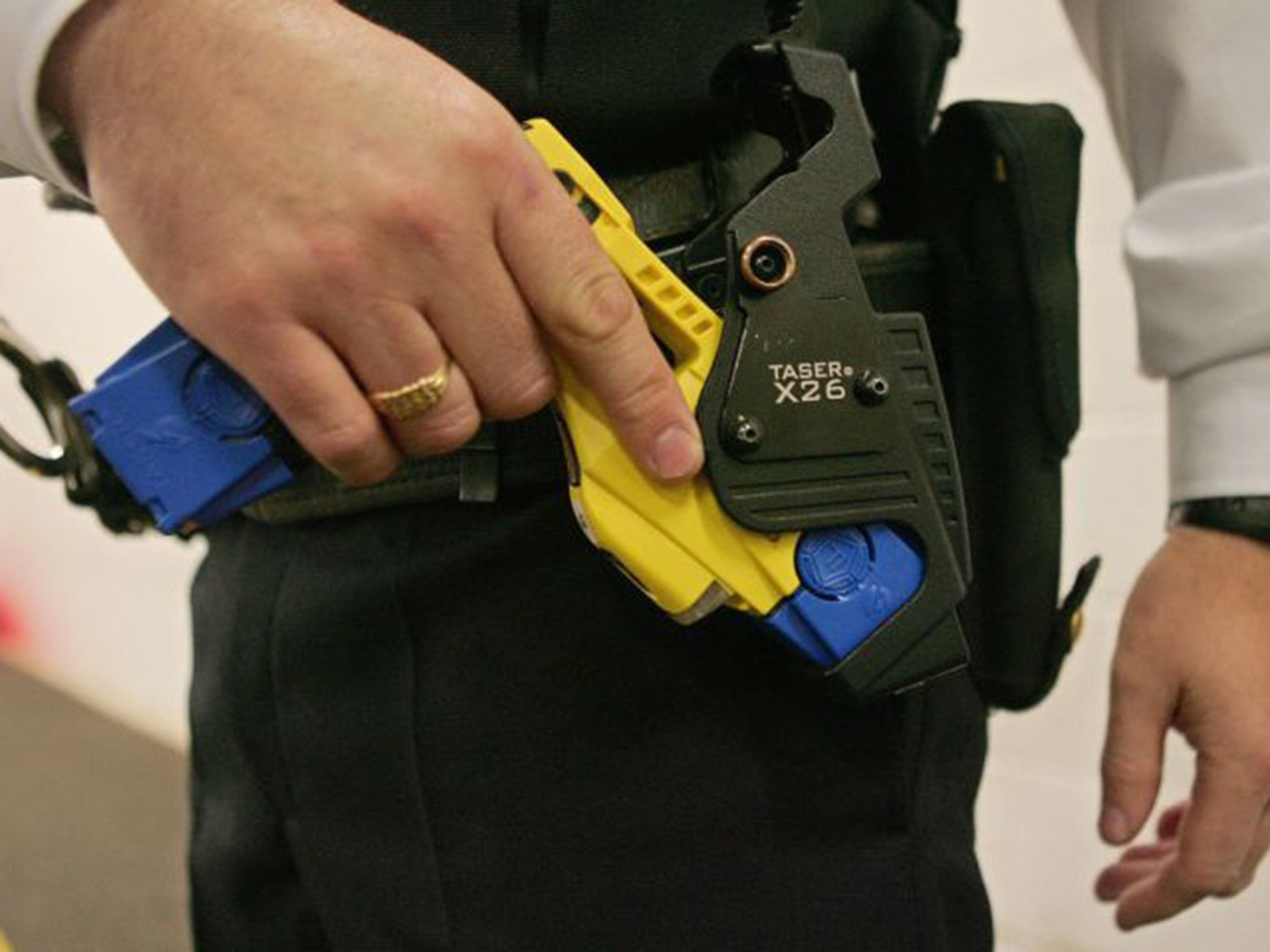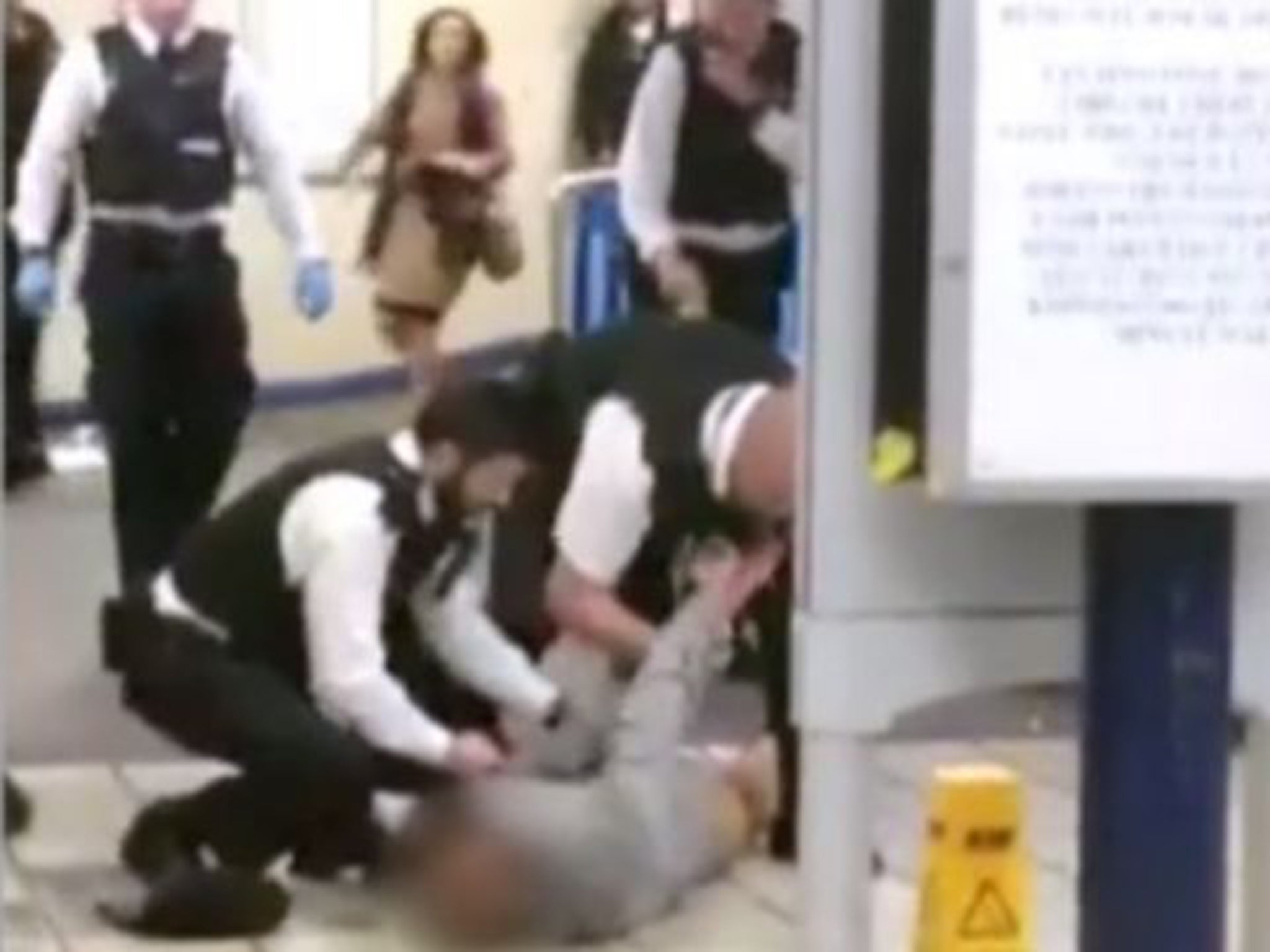Majority of suspects Tasered by police are mentally ill, figures show
Forces' use of the stun guns in England and Wales increased from 6,238 incidents in 2010 to 9,196 last year

More than two-thirds of people who had a Taser used against them in England and Wales between 2010 and 2014 had been identified by police as mentally ill, according to Home Office figures.
Police use of the stun guns increased over the period from 6,238 incidents in 2010 to 9,196 last year, and there has been a corresponding rise in the number of incidents involving mentally ill people, from 2,737 in 2010 to 4,200 in 2014.
The latest statistics were released in response to a Freedom of Information request made by the website The Justice Gap. It revealed that in 67 per cent of cases in which Tasers were discharged, they were fired at people identified by officers as mentally ill.
When cases in which the weapons were drawn, aimed but not fired were included in the data, mentally ill people were the target in only 45 per cent of incidents.
The Prime Minister made the case for greater availability of the stun guns for police in the aftermath of a knife attack at Leytonstone underground station in east London earlier this month. Officers repeatedly fired a Taser at a man who had stabbed two passers-by.
David Cameron was responding to a question in the House of Commons by the Tory MP Nicola Blackwood, who had praised the actions of police using a Taser to stop a man who fatally stabbed a father-of-two at a Poundland in her Abingdon constituency.

Responding to the new figures, Mike Penning, the minister for Policing, said Tasers provided the police with “an important tactical option when facing potentially physically violent situations”. He added: “But just as with sensitive powers, such as stop-and-search and mental-health detention, the police use of force warrants proper accountability and transparency.”
Norman Lamb, the Liberal Democrat health spokesperson who launched the cross-party Equality for Mental Health campaign last month, described the findings as “clearly very worrying”. He said: “It is crucial that police forces have proper guidance and training in place to ensure officers are able to act in a safe manner when working with someone with mental ill health.”
Any officer equipped with a Taser must pass a nationally recognised training course which covers encounters with people who are suffering from mental illness, a National Police Chiefs’ Council spokesman said.
“Dealing with people in crisis is a core part of policing,” he added. “We have made great strides in ensuring that our officers treat people with mental ill health sensitively and help them get the right treatment. However, the first duty of the police is to protect the public from harm so use of Tasers will remain an option when someone is posing a risk of harm either to themselves or others.”
Brian Dow, the director of external affairs at the charity Rethink Mental Illness, recognised that officers “had to take tough and quick decisions in highly pressurised circumstances”. But he said: “These people are unwell and will already be in great distress so every other option should be exhausted before force is used. The police do their best, but this suggests they need better training in mental health and better support from the health system so they are not put in a position where they feel they need to resort to Tasering.”
Earlier this month, West Midlands police paid out two undisclosed sums to Cornelius Thomas, a 39-year-old man from Birmingham who was diagnosed with bipolar affective disorder in 1999 but who has no history of violence.
In 2011, following an afternoon visit by his doctor, his mental health team decided that Mr Thomas should be sectioned under the Mental Health Act as a result of concerns about whether he was taking his medication. Police back-up and an ambulance were called.
The same evening, Mr Thomas returned home to be met by four police officers. He claimed that he was pulled from his car, leaving his eight-year-old daughter strapped in the back seat. What happened next is disputed, but Mr Thomas insists he was not aggressive. He was Tasered four times in quick succession.
“I have never felt anything like it in my life,” he said. “It’s a thousand times worse than an electric shock. You feel it in your whole body; your arms, your legs and your brain.
“I fell to the ground in a press-up position. I walked away and then they shot me in the back. I fell back down again. I managed to walk all the way to my door – about six metres – and then they shot me again. I fell to the floor and fainted. When I came round, there was a policeman sitting on me. I could not breathe.” He was handcuffed, taken to hospital and detained under the Mental Health Act.
Four months later, Mr Thomas was visited by social workers accompanied by police officers to check on the welfare of his daughter. The social workers were satisfied but police later returned to the house to make a further check. When Mr Thomas refused them entry, they smashed his front door down and pursued him into his garden with Taser guns drawn. He was arrested for breach of the peace and detained for eight hours.
West Midlands Police settled without admitting liability. “This claim is now resolved and, following an investigation by the force’s professional standards department, no disciplinary action was taken against any officers,” a police spokesman said.
According to The Justice Gap, the West Midlands force recorded the highest number of Taser incidents last year on people with mental illness, at 833 instances, a figure that was, for example, eight times as many per capita as Essex Police.
“My concern is that there is a mission creep and a disproportionate use of Tasers,” said Mr Thomas’s solicitor, Iain Gould, who specialises in actions against the police. “Too often it has become the default position. There is a worrying trend of Tasers being used in circumstances that just don’t call for it, such as in the case of Cornelius Thomas.”
According to a psychiatric assessment made in April this year, Mr Thomas was still suffering post-traumatic disorder as a result of his encounters with the police and, when discussing the June 2011 incident, was described as “anxious and hyper-vigilant with tremors in both his upper limbs”.
